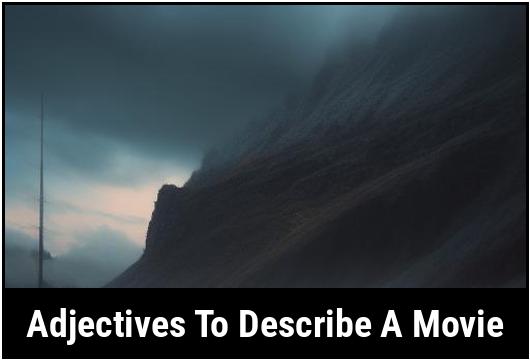- You are here:
- Home »
- adjectives
- » 41 Adjectives To Describe A Movie

41 Adjectives To Describe A Movie
When expressing our thoughts and opinions about a movie, using adjectives allows us to paint a vivid picture of our experience to others. Adjectives are an essential tool to convey the essence, emotions, and impact of a movie effectively. This article will provide an in-depth exploration of the various adjectives that can be used to describe a movie, offering a comprehensive guide to selecting the most suitable adjectives to capture the essence of a film.
Key Takeaways
- Adjectives are an integral part of describing a movie, as they help convey the tone, emotions, and overall impact of the film.
- Choosing the right adjectives can significantly enhance the way we articulate our thoughts and opinions about a movie.
- Different types of adjectives can be used to describe various aspects of a movie, including its visual and auditory elements, storyline, characters, and emotional impact.
Why Use Adjectives To Describe A Movie
Adjectives play a crucial role in shaping our perception and understanding of a movie. They provide depth and nuance to our descriptions and enable us to communicate our thoughts and emotions effectively to others. By using carefully selected adjectives, we can create a compelling and nuanced portrayal of a movie, allowing others to gain insights into its unique qualities and characteristics.
Furthermore, adjectives allow us to convey the emotional impact of a movie, whether it be heartwarming, thrilling, poignant, or thought-provoking. They help in capturing the essence of the film and resonate with the audience on a deeper level, fostering a shared understanding of its qualities and virtues.
How To Choose The Right Adjective To Describe A Movie
Selecting the right adjectives to describe a movie requires a thoughtful and analytical approach. It involves paying attention to various aspects of the film, including its visual and auditory elements, storyline, characters, and emotional resonance. When choosing adjectives, consider the following factors:
-
Emotional Impact: Reflect on the emotional journey the movie takes you on. Does it evoke feelings of suspense, joy, sorrow, or excitement? Select adjectives that encapsulate these emotions effectively.
-
Visual and Auditory Elements: Assess the visual and auditory aspects of the film, such as cinematography, special effects, sound design, and musical score. Use adjectives that capture the visual and auditory splendor of the movie.
-
Character Portrayal: Consider the depth and complexity of the characters in the movie. Choose adjectives that aptly describe the character dynamics, development, and interactions.
-
Storyline and Plot: Evaluate the storytelling prowess and narrative arc of the movie. Seek adjectives that convey the uniqueness, coherence, and impact of the storyline.
-
Overall Impression: Take into account your overall impression of the movie. What sets it apart? What lingering emotions or thoughts does it leave you with?
By honing in on these factors, you can pinpoint adjectives that encapsulate the essence and impact of the movie, effectively conveying its distinctiveness to others.
Types Of Adjectives For Describing A Movie
1. Visual And Aesthetic Adjectives
Visual and aesthetic adjectives pertain to the visual quality and beauty of a movie. They encompass aspects such as cinematography, set design, lighting, color palette, and overall visual composition. Examples of visual and aesthetic adjectives include:
-
Breathtaking: This adjective can be used to describe visually stunning landscapes, breathtaking vistas, or awe-inspiring scenes that captivate the audience.
-
Picturesque: Use this adjective to evoke a sense of visual beauty and charm, often associated with visually striking or stunning imagery.
-
Visually Striking: This adjective highlights the visually impactful and remarkable elements of a movie, drawing attention to its impressive visual aesthetics.
-
Vibrant: Use this adjective to convey the lively and dynamic visual aura created by a movie, especially in terms of color and visual composition.
-
Ethereal: Describe a movie with this adjective when it exhibits a dreamlike, otherworldly visual quality that enchants and mesmerizes the audience.
2. Emotional And Narrative Adjectives
Emotional and narrative adjectives pertain to the storytelling, emotional resonance, and impact of a movie. They encapsulate the depth, complexity, and impact of the storyline, character arcs, and overall emotional experience. Examples of emotional and narrative adjectives include:
-
Heartwrenching: Use this adjective to convey the deeply emotional and poignant nature of a movie, particularly in evoking strong feelings of sadness or empathy.
-
Gripping: Describe a movie as gripping when it captivates and holds the audience’s attention with its intense and compelling storytelling.
-
Empowering: Use this adjective to convey the uplifting and inspiring nature of a movie, especially when it instills a sense of strength and resilience in the audience.
-
Intriguing: This adjective denotes a movie with a compelling and enigmatic storyline that piques curiosity and engages the audience’s imagination.
-
Epic: Describe a movie as epic when it portrays grandeur, scale, and monumental storytelling, often associated with larger-than-life narratives and themes.
3. Character-Centric Adjectives
Character-centric adjectives focus on the portrayal, development, and dynamics of the characters in a movie. They capture the depth, complexity, and relatability of the characters, as well as their impact on the overall narrative. Examples of character-centric adjectives include:
-
Multifaceted: Use this adjective to describe characters with intricate and multi-dimensional personalities, reflecting depth and complexity in their portrayal.
-
Compelling: Characterize a movie as compelling when its characters are deeply engaging, evoking a strong sense of intrigue and investment from the audience.
-
Authentic: This adjective conveys the genuine, realistic portrayal of characters that resonates with authenticity and emotional truth.
-
Dynamic: Use this adjective to highlight characters with a vibrant and evolving presence, contributing to the movie’s narrative momentum and emotional resonance.
-
Memorable: Describe characters as memorable when they leave a lasting impression on the audience, exhibiting qualities that resonate long after the movie has ended.
4. Genre-Specific Adjectives
Genre-specific adjectives cater to the distinct qualities and conventions of different movie genres, capturing the unique characteristics and traits associated with each genre. Examples of genre-specific adjectives include:
-
Suspenseful: This adjective pertains to movies in the thriller or suspense genre, highlighting their ability to create tension, anticipation, and a sense of unease.
-
Whimsical: Describe movies with fantastical or whimsical elements using this adjective, denoting their playful, imaginative, and magical nature.
-
Hilarious: Use this adjective to characterize comedy films that evoke hearty laughter and amusement through their humor and comedic prowess.
-
Chilling: This adjective signifies movies in the horror or psychological thriller genre, emphasizing their ability to evoke fear, unease, and a sense of foreboding.
-
Enthralling: Describe a movie as enthralling when it captivates and immerses the audience, especially in genres such as fantasy, adventure, or science fiction.
Adjectives are indispensable in conveying the essence, emotional impact, and distinctive qualities of a movie. By carefully selecting adjectives that encapsulate the visual, emotional, and narrative aspects of a film, we can articulate our thoughts and opinions in a compelling and evocative manner, allowing others to gain a deeper understanding of its unique attributes. Whether describing the visual splendor, emotional resonance, character dynamics, or genre-specific traits of a movie, adjectives serve as powerful tools for expressing our appreciation and critique of films. Through the thoughtful application of adjectives, we can enrich our discussions about movies, fostering a more nuanced and insightful discourse within the realm of cinema appreciation and criticism.
Adjectives To Describe A Movie
1. Captivating
A captivating movie engulfs its audience, holding their attention from start to finish. It effortlessly draws you into its world, making it nearly impossible to look away from the screen.
2. Breathtaking
A breathtaking film leaves you in awe, as it showcases stunning visuals, breathtaking landscapes, or mesmerizing cinematography that takes your breath away. It immerses you in another dimension and leaves a lasting impression.
3. Heartwarming
A heartwarming movie fills you with warmth, joy, and a fuzzy feeling. It tugs at your heartstrings, leaving you with a sense of optimism, love, or happiness.
4. Gripping
A gripping film engrosses you completely. It creates a sense of suspense and tension, making your heart race as you eagerly await what happens next.
5. Thought-provoking
A thought-provoking movie challenges your mind, stirring deep thoughts and discussions. It explores complex themes, societal issues, or philosophical questions, leaving you pondering and questioning long after the credits roll.
6. Whimsical
A whimsical film is playfully eccentric and imaginative. It takes you on a magical journey, full of wonder and enchantment, where anything seems possible.
7. Hilarious
A hilarious movie never fails to make you laugh out loud. Its comedic timing, witty dialogue, or slapstick humor provide endless moments of amusement and joy.
8. Nostalgic
A nostalgic film evokes a sense of longing for the past. It resonates with memories and emotions, transporting you back in time to relive those cherished moments.
9. Suspenseful
A suspenseful film keeps you on the edge of your seat, wondering what will happen next. It creates an atmosphere of uncertainty and anticipation, effectively maintaining tension throughout the story.
10. Heartbreaking
A heartbreaking movie elicits deep sadness and emotional distress. It touches your soul, leaving you emotionally overwhelmed, empathetic, and often reaching for a tissue.
11. Mesmerizing
A mesmerizing film captivates you with its sheer beauty, entrancing you with its visuals, or enchanting you with its storytelling. It hypnotizes you, leaving you spellbound.
12. Uplifting
An uplifting movie lifts your spirit, leaving you feeling empowered, motivated, and inspired. It often tells a tale of triumph and resilience, reminding you of the human spirit’s inherent resilience.
13. Thrilling
A thrilling movie offers an exhilarating ride. It fills you with excitement, adrenaline, and a rush of emotions, leaving you at the edge of your seat, eagerly anticipating each twist and turn.
14. Poignant
A poignant film evokes a profound sense of sadness, empathy, or tenderness. It touches the deepest corners of your heart, eliciting a bittersweet mixture of emotions.
15. Unforgettable
An unforgettable movie leaves an indelible mark on your memory. It stays with you long after watching, creating a lasting impact on your thoughts, feelings, or even worldview.
16. Intense
An intense film provokes strong emotions, leaving you emotionally drained or overwhelmed. It pushes boundaries and engages your senses fully, making you feel every raw moment.
17. Epic
An epic movie is grandiose in scale and ambition. It takes you on a monumental journey across time or space, leaving you awestruck by its scope and magnitude.
18. Enthralling
An enthralling film captivates and entices, holding your attention with its engaging plot, compelling characters, or powerful performances. It immerses you in its world, urging you to keep watching.
19. Inspiring
An inspiring movie uplifts your spirits and motivates you to chase your dreams. It showcases extraordinary individuals, often based on true stories, who overcome obstacles, inspiring you to do the same.
20. Magical
A magical film transports you to a realm of enchantment, where the ordinary merges with the extraordinary. It fills you with a sense of childlike wonder and leaves you believing in the impossible.
21. Masterful
A masterful movie showcases exceptional craftsmanship in every aspect. It demonstrates superior storytelling, impressive visuals, or flawless performances, leaving you in awe of the director’s artistry.
22. Innovative
An innovative film breaks new ground in terms of storytelling, technology, or presentation. It pushes boundaries and challenges cinematic conventions, often becoming a trendsetter for future movies.
23. Authentic
An authentic film feels genuine and true to life. It captures real emotions, relatable experiences, or portrays characters with depth, providing a raw and honest portrayal of the human condition.
24. Spellbinding
A spellbinding movie ensnares your attention completely. It weaves a web of intrigue, leaving you hypnotized and transfixed by its enigmatic story or characters.
25. Riveting
A riveting film keeps you engaged and invested in its story from beginning to end. It’s filled with unexpected twists and turns, creating a rollercoaster ride of emotions.
26. Impactful
An impactful movie leaves a lasting impression on your mind and heart. It tackles important social issues, raises awareness, or drives positive change, encouraging thoughtful reflection or discourse.
27. Exhilarating
An exhilarating movie provides an adrenaline rush, pumping your heart and energizing your senses. It delivers an exhilarating experience through breathtaking action, fast-paced sequences, or thrilling adventures.
28. Mind-bending
A mind-bending film challenges your perception of reality. It delves into the realm of the unknown, leaving you questioning your own understanding of the world and the boundaries of possibility.
29. Lighthearted
A lighthearted movie offers a carefree and enjoyable experience. It’s filled with humor, warmth, and delightful moments that lighten your mood and bring a smile to your face.
30. Unpredictable
An unpredictable film keeps you guessing, with a storyline that takes unexpected turns and surprises you at every corner. It keeps you hooked, never allowing you to anticipate what will happen next.
31. Powerful
A powerful movie resonates deeply within your soul. It confronts difficult subjects, provoking a powerful emotional response that lingers, leaving you contemplating its impact.
32. Visually stunning
A visually stunning film mesmerizes your eyes and sets your imagination aflame. It boasts breathtaking cinematography, intricate sets, or visual effects that transport you to imaginary worlds.
33. Dramatic
A dramatic movie emphasizes intense emotions and heightened tension. It creates a theatrical experience, where conflicts and emotions are magnified, leaving you emotionally invested in the characters.
34. Authentic
An authentic movie presents a genuine representation of its subject matter, whether it’s a historical event, a particular culture, or a personal story. It immerses you in realism and authenticity.
35. Mind-Blowing
A mind-blowing film astonishes and overwhelms you with its surprising plot twists, intricate narratives, or extraordinary concept. It challenges your perception and leaves you reeling with awe.
36. Memorable
A memorable movie lingers in your memory, leaving an imprint long after you’ve finished watching. It has unforgettable characters, memorable quotes, or scenes that become icons of popular culture.
37. Immersive
An immersive movie engulfs you in its world. It transports you and makes you feel a part of its narrative, blurring the line between fiction and reality.
38. Evocative
An evocative film stirs deep emotions, evoking specific moods, memories, or sensations. It uses powerful imagery, music, or storytelling techniques to elicit a visceral response from its audience.
39. Cinematic
A cinematic movie is visually stunning, using the full potential of the medium to tell its story. It employs composition, camera angles, and editing techniques that enhance the overall experience.
40. Charming
A charming film possesses a delightful and endearing quality. It captivates with its charm, leaving you feeling warm, fuzzy, and simply enchanted by its characters or story.
41. Timeless
A timeless movie transcends the boundaries of time and remains relevant, relatable, and impactful across generations. Its themes and messages have an everlasting resonance that withstands the test of time.
Examples Of Adjectives For Different Types Of Movies
When describing a movie, using the right adjectives can make all the difference in effectively conveying its essence to your audience. Adjectives are descriptive words that add depth and detail to our descriptions, giving readers or listeners a clearer picture of what to expect.
-
Action-Packed: This adjective refers to movies that are filled with thrilling and intense sequences of physical or combat-based activities. Examples of action-packed movies include "Die Hard," "Mad Max: Fury Road," and "The Matrix."
-
Captivating: This adjective is used to describe movies that are so engrossing and fascinating that they hold the viewer’s attention throughout. Movies like "Inception," "Gone Girl," and "The Shawshank Redemption" can be described as captivating.
-
Hilarious: This adjective is used for movies that are extremely funny and bring about laughter. Examples of hilarious movies include "Bridesmaids," "Anchorman: The Legend of Ron Burgundy," and "Superbad."
-
Gripping: This adjective is used to describe movies that are emotionally engaging and hold the viewer in suspense or tension. Movies like "The Silence of the Lambs," "Se7en," and "Memento" can be described as gripping.
-
Heartwarming: This adjective is used for movies that evoke feelings of warmth, tenderness, and sentimentality. Examples include "E.T. the Extra-Terrestrial," "It’s a Wonderful Life," and "The Pursuit of Happyness."
-
Romantic: This adjective refers to movies that center around love, romance, and emotional connections between characters. Films like "The Notebook," "Romeo + Juliet," and "Pretty Woman" fall under this category.
-
Terrifying: This adjective is used to describe movies that instill fear, fright, or horror in the viewer. Films like "The Exorcist," "The Shining," and "Psycho" can be described as terrifying.
-
Inspiring: This adjective is used to describe movies that motivate or encourage viewers, leaving them feeling inspired and uplifted. Examples of inspiring movies include "Rocky," "Dead Poets Society," and "The Pursuit of Happyness."
-
Mind-bending: This adjective is used for movies that challenge the viewer’s perception, present complex concepts, or have unexpected plot twists. Movies like "Inception," "The Prestige," and "Donnie Darko" can be described as mind-bending.
-
Poignant: This adjective is used to describe movies that evoke strong emotions, particularly sadness or deep sentiment. Films like "Schindler’s List," "Life is Beautiful," and "The Green Mile" can be described as poignant.
These are just a few examples of adjectives that can be used to describe different types of movies. It’s important to note that movies can often fall into multiple categories, and the choice of adjectives may vary depending on the specific aspects you want to highlight.
Common Mistakes In Using Adjectives To Describe Movies
While adjectives can be powerful tools for describing movies, they can also be misused or overused, leading to ineffective descriptions. Here are some common mistakes to avoid when using adjectives to describe movies:
-
Vague or generic adjectives: Using adjectives like "good," "nice," or "bad" to describe a movie is subjective and lacks specificity. Instead, opt for more descriptive adjectives that provide a clearer picture of the movie’s qualities.
-
Overwhelming with adjectives: It’s important to strike a balance and use a combination of adjectives that accurately capture the essence of the movie without overwhelming the reader or listener. Too many adjectives can dilute the impact of each word.
-
Using clichéd adjectives: Avoid using clichéd adjectives like "epic," "amazing," or "unforgettable" unless they truly capture the unique qualities of the movie. Using these adjectives too frequently can make your descriptions appear generic and uninteresting.
-
Lack of context: When describing a movie, it’s essential to provide context and explain why a particular adjective applies. Without context, the adjective may not carry much meaning or impact.
-
Neglecting subtlety: Movies are often multi-dimensional and can evoke a range of emotions or have varying tones. It’s important to choose adjectives that reflect the nuances of the movie rather than oversimplifying it with a single-word description.
By avoiding these common mistakes, you can effectively use adjectives to create engaging and informative descriptions of movies.
Using Adjectives Effectively
To use adjectives effectively in describing movies, consider the following tips:
-
Understand the movie’s genre and themes: Familiarize yourself with the movie’s genre and underlying themes to help you select adjectives that accurately capture its essence. Different genres evoke different emotions and convey specific tones, so adapt your choice of adjectives accordingly.
-
Consider the target audience: Adjectives may vary depending on the target audience of the movie. A family-friendly film may be described as "charming" or "wholesome," while a gritty thriller may be described as "gritty" or "intense." Tailor your choice of adjectives to resonate with the intended audience.
-
Use comparisons or analogies: Comparisons can be a powerful way to convey the qualities of a movie. For example, you could describe a movie as "an adrenaline-fueled rollercoaster ride" or "a visual feast for the senses." Analogies help paint a vivid picture in the reader’s mind and add depth to your descriptions.
-
Incorporate adjectives in context: Use adjectives in conjunction with specific examples or scenes from the movie to provide context and reinforce your description. This adds credibility and helps the reader or listener connect with your description on a more personal level.
-
Mix positive and negative adjectives: Rather than relying solely on positive or negative adjectives, consider incorporating a mix of both to paint a more balanced and realistic picture of the movie. This allows for a more nuanced and comprehensive description.
-
Always strive for accuracy: It’s crucial to choose adjectives that accurately reflect the movie’s qualities. Avoid exaggerations or misrepresentations, as this can lead to disappointment or false expectations for the audience.
-
Read or listen to film reviews: Reading or listening to film reviews by professional critics can help you discover new adjectives or gain a deeper understanding of how to effectively describe movies. Pay attention to how they use adjectives to convey their thoughts and opinions.
By following these guidelines, you can effectively utilize adjectives to create vivid and engaging descriptions of movies that resonate with your audience.
Exercises And Practice
To practice using adjectives to describe movies, you can try the following exercises:
-
Write a brief description of a movie using at least five adjectives. Make sure each adjective accurately represents a different aspect of the movie, such as the genre, plot, characters, or emotional impact.
-
Watch a movie and take notes on the different aspects you want to describe. Afterward, write a paragraph or two capturing the essence of the movie using a variety of adjectives. Share your description with others to see if it effectively conveys the movie’s qualities.
-
Analyze a movie review or critique and identify the adjectives used by the writer to describe the movie. Consider the impact of these adjectives and how they contribute to the overall evaluation of the film.
-
Create a list of adjectives that evoke specific emotions or responses, such as excitement, fear, nostalgia, or inspiration. Use this list as a reference when describing movies to evoke those emotions in your audience.
-
Challenge yourself to describe a movie using only one adjective. Experiment with different adjectives and see how effectively you can convey the essence of the movie with a single word.
Practicing these exercises will help you develop your skills in effectively using adjectives to describe movies, enabling you to engage and captivate your audience.
Conclusion
Choosing the right adjectives to describe a movie can significantly impact the way it is perceived by others. By considering the movie’s genre, themes, and target audience, you can select adjectives that accurately capture its essence. Avoid common mistakes such as using vague or clichéd adjectives, and instead strive for accuracy and context in your descriptions. By practicing and refining your skills in using adjectives effectively, you will be able to create vivid and engaging descriptions of movies that resonate with your audience.
FAQS On Adjectives To Describe A Movie
What Are Some Adjectives To Describe A Movie’s Storyline?
Compelling, gripping, engaging, twist-filled, intriguing.
Can You Provide Adjectives To Describe A Movie’s Setting?
Enchanting, captivating, atmospheric, picturesque, immersive.
How Would You Describe A Movie’s Cinematography?
Breathtaking, stunning, visually stunning, artful, picturesque.
What Words Can Be Used To Describe A Movie’s Acting?
Stellar, riveting, convincing, authentic, powerful.
Can You Suggest Adjectives To Describe A Movie’s Sound Effects?
Dynamic, immersive, spine-tingling, realistic, impactful.








